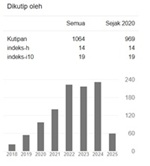IDENTIFIKASI KESALAHAN MAHASISWA MENURUT WATSON DALAM MENYELESAIKAN MASALAH FUNGSI PEMBANGKIT BERDASARKAN TIPE KEPRIBADIAN KEIRSEY
Abstract
The purpose of this study is to identify the mistakes of students with artistic, idealistic, guardian, and rational personality in solving generating function problems. Qualitative is the approach in this research, while the type of research is exploratory descriptive. The instruments in this study were a mathematical ability test, the Keirsey Temprament Sorter, problem solving tasks, and interview guidelines. The validity of student error data was checked using technical triagulation. Based on the results of the study, students with artisan personalities met the criteria for missing data errors, response level conflicts, indirect manipulation, and skill hierarchical problems. Students with idealistic personality meet the criteria for missing data errors and students with guardian personalities meet the criteria for errors in skill hierarchy problems. Meanwhile, students with rational personality meet the criteria for missing data errors, missing conclusions, response level conflicts, indirect manipulation, and skill hierarchy problems. Only students with guardian personality can solve problems using the FPB concept, namely correctly.
Keywords
Full Text:
PDFReferences
Himmi, N., & Asmaul, H. (2020). Analisis Kesalahan Mahasiswa dalam Menyelesaikan Soal Cerita pada Materi Prisnsip Inklsi Eksklusi dengan Prosedur Newman. PYTHAGORAS: Jurnal Program Studi Pendidikan Matematika, 9(1), 18–27.
Humairoh, D. (2021). Analisis Proses Pemodelan Masalah Matematika Peserta Dididk Ditinjau dari Tipe Kepribadian Keirsey. UIN Sunan Ampel Surabaya.
Mafruhah, L., & Muchyidin, A. (2020). Analisis Kesalahan siswa Dalam Menyelesaikan Soal Cerita Matematika Berdasarkan Kriteria Watson. PYTHAGORAS: Jurnal Pendidikan Matematika, 15(1), 24–35.
Mahmudati, R. (2017). Analisis Kesalahan Mahasiswa dalam Menyelesaikan Permasalahan Fungsi Rekursif pada Mata Kuliah Matematika Diskrit Menurut Newman. Jurnal Penelitian Dan Pengabdian Kepada Masyarakat, 4(3), 207–212.
Maya, N. (2018). Analisis Tipe Kepribadian Siswa dan Pengaruhnya Terhadap Kemampuan Pemecahan Masalah Matematika Menggunakan Model Problem BAsed Learning. Symmetry" PAsundan Journal of Research in Mathematics Learning and Education, 3(1), 41–55.
Romadiastri, Y. (2012). Analisis Kesalahan MAhasiswa Matematika dalam Menyelesaikan Soal-Soal Logika. Jurnal PHENOMENON, 2(1), 75–93.
Shiddiq, M. M. (2019). Fungsi Pembangkit-Teknik Menghiung. Retrieved from https://www.haimatematika.com/2019/11/fungsi-pembangkit-teknik-menghitung.html
Sholihah, D. A., & Mahmudi, A. (2015). Kefektifan Experiental Learning Pembelajaran Matematika MTs. Materi Bangun Ruang Sisi Datar. Jurnal Riset Pendidikan Matematika, 2(2), 175–185.
Suandito, B. (2017). Bukti Informal dalam Pembelajaran Matematika. Al-JAbar: Jurnal Pendidikan Matematika, 8(1), 13–24.
DOI: http://dx.doi.org/10.53712/sigma.v7i2.1297
Refbacks
- There are currently no refbacks.
Indexed by:
Published by Prodi Pendidikan Matematika FKIP Universitas Madura
Jl. Raya Panglegur Km 3,5 Pamekasan
Phone: (0324) 322231
website: http://http://ejournal.unira.ac.id/index.php/jurnal_sigma/index
Email: math@unira.ac.id

SIGMA by Universitas Madura is licensed under a Creative Commons Attribution 4.0 International License.

2.jpg)











